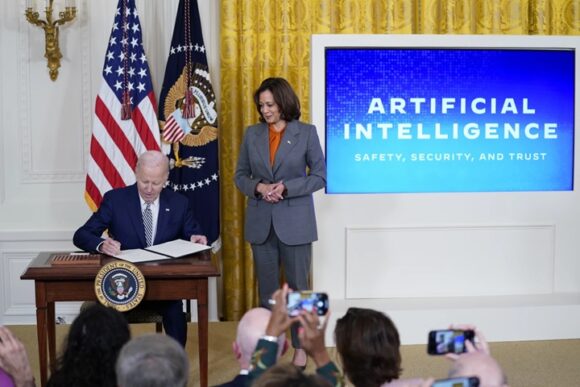 President Biden signs an executive order on artificial intelligence as Vice President Harris looks on . Copyright (AP Evan Vucci).
President Biden signs an executive order on artificial intelligence as Vice President Harris looks on . Copyright (AP Evan Vucci).
Dear Commons Community,
President Joe Biden on Monday signed an ambitious executive order on artificial intelligence that seeks to balance the needs of cutting-edge technology companies with national security and consumer rights, creating an early set of guardrails that could be fortified by legislation and global agreements. As reported by The Associated Press.
Before signing the order, Biden said AI is driving change at “warp speed” and carries tremendous potential as well as perils.
“AI is all around us,” Biden said. “To realize the promise of AI and avoid the risk, we need to govern this technology.”
The order is an initial step that is meant to ensure that AI is trustworthy and helpful, rather than deceptive and destructive. The order — which will likely need to be augmented by congressional action — seeks to steer how AI is developed so that companies can profit without putting public safety in jeopardy.
Using the Defense Production Act, the order requires leading AI developers to share safety test results and other information with the government. The National Institute of Standards and Technology is to create standards to ensure AI tools are safe and secure before public release.
The Commerce Department is to issue guidance to label and watermark AI-generated content to help differentiate between authentic interactions and those generated by software. The extensive order touches on matters of privacy, civil rights, consumer protections, scientific research and worker rights.
White House chief of staff Jeff Zients recalled Biden giving his staff a directive when formulating the order to move with urgency.
“We can’t move at a normal government pace,” Zients said the Democratic president told him. “We have to move as fast, if not faster, than the technology itself.”
In Biden’s view, the government was late to address the risks of social media and now U.S. youth are grappling with related mental health issues. AI has the positive ability to accelerate cancer research, model the impacts of climate change, boost economic output and improve government services among other benefits. But it could also warp basic notions of truth with false images, deepen racial and social inequalities and provide a tool to scammers and criminals.
With the European Union nearing final passage of a sweeping law to rein in AI harms and Congress still in the early stages of debating safeguards, the Biden administration is “stepping up to use the levers it can control,” said digital rights advocate Alexandra Reeve Givens, president of the Center for Democracy & Technology. “That’s issuing guidance and standards to shape private sector behavior and leading by example in the federal government’s own use of AI.”
The order builds on voluntary commitments already made by technology companies. It’s part of a broader strategy that administration officials say also includes congressional legislation and international diplomacy, a sign of the disruptions already caused by the introduction of new AI tools such as ChatGPT that can generate text, images and sounds.
The guidance within the order is to be implemented and fulfilled over the range of 90 days to 365 days.
Last Thursday, Biden gathered his aides in the Oval Office to review and finalize the executive order, a 30-minute meeting that stretched to 70 minutes, despite other pressing matters, including the mass shooting in Maine, the Israel-Hamas war and the selection of a new House speaker.
Biden was profoundly curious about the technology in the months of meetings that led up to drafting the order. His science advisory council focused on AI at two meetings and his Cabinet discussed it at two meetings. The president also pressed tech executives and civil society advocates about the technology’s capabilities at multiple gatherings.
“He was as impressed and alarmed as anyone,” deputy White House chief of staff Bruce Reed said in an interview. “He saw fake AI images of himself, of his dog. He saw how it can make bad poetry. And he’s seen and heard the incredible and terrifying technology of voice cloning, which can take three seconds of your voice and turn it into an entire fake conversation.”
The issue of AI was seemingly inescapable for Biden. At Camp David one weekend, he relaxed by watching the Tom Cruise film “Mission: Impossible — Dead Reckoning Part One.” The film’s villain is a sentient and rogue AI known as “the Entity” that sinks a submarine and kills its crew in the movie’s opening minutes.
“If he hadn’t already been concerned about what could go wrong with AI before that movie, he saw plenty more to worry about,” said Reed, who watched the film with the president.
Governments around the world have raced to establish protections, some of them tougher than Biden’s directives. After more than two years of deliberation, the EU is putting the final touches on a comprehensive set of regulations that targets the riskiest applications with the tightest restrictions. China, a key AI rival to the U.S., has also set some rules.
This is a good gesture on the part of President Biden but it is unlikely to have a major real affect on how AI is developed. It is difficult to control what happens in other countries. Presently there are more than 50,000 companies around the world involved in AI development.
Tony


